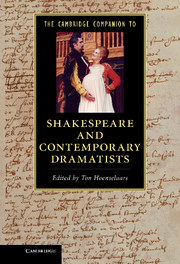Book contents
- Frontmatter
- Contents
- Illustrations
- Contributors
- Preface
- Chronology of the life and work of Shakespeare and contemporary dramatists
- 1 John Lyly and the University Wits
- 2 Thomas Kyd and the Elizabethan blockbuster
- 3 ‘The words of Mercury’
- 4 The dyer’s hand
- 5 Urbane John Marston
- 6 Thomas Dekker and the emergence of city comedy
- 7 Shakespeare
- 8 Thomas Heywood
- 9 George Chapman’s learned drama
- 10 Francis Beaumont and John Fletcher’s tragicomedy as musical melodrama
- 11 Thomas Middleton and the early modern theatre
- 12 John Webster
- 13 John Ford
- 14 Philip Massinger
- 15 Richard Brome and the idea of a Caroline theatre
- 16 Troublesome histories
- Select bibliography
- Index
- References
16 - Troublesome histories
Performance and early modern drama
Published online by Cambridge University Press: 05 December 2012
- Frontmatter
- Contents
- Illustrations
- Contributors
- Preface
- Chronology of the life and work of Shakespeare and contemporary dramatists
- 1 John Lyly and the University Wits
- 2 Thomas Kyd and the Elizabethan blockbuster
- 3 ‘The words of Mercury’
- 4 The dyer’s hand
- 5 Urbane John Marston
- 6 Thomas Dekker and the emergence of city comedy
- 7 Shakespeare
- 8 Thomas Heywood
- 9 George Chapman’s learned drama
- 10 Francis Beaumont and John Fletcher’s tragicomedy as musical melodrama
- 11 Thomas Middleton and the early modern theatre
- 12 John Webster
- 13 John Ford
- 14 Philip Massinger
- 15 Richard Brome and the idea of a Caroline theatre
- 16 Troublesome histories
- Select bibliography
- Index
- References
Summary
Performance history has much to contribute to scholarly engagement with, and understanding of, early modern plays, and this chapter is grounded in the belief that performed responses to the dramaturgical challenges posed by any Renaissance play are worth attending to, criticising and learning from. Even the most scrupulous reader or editor will struggle to understand the full theatricality of a play without the insights provided by performance: the real impression a silent character can make on stage; the effect of hearing a song rather than reading it; the comic impact of a skilfully performed chase sequence. In addition, character relationships can become clarified by asking pragmatic staging questions. For example in Richard Brome’s rarely performed play, The City Wit, Brome characterises the marriage of Sir Andrew and Lady Ticket as loveless. While the tiny, but telling, detail that the Tickets never speak to each other in the entire play is not obvious when reading this fast-moving comedy, the actors playing the Tickets in Kim Durban’s 2007 production of The City Wit identified this aspect of the Tickets’ relationship almost immediately, simply by asking pragmatic acting questions in rehearsals: ‘Who is my character speaking to? And who is my character not speaking to?’
As very few Renaissance plays apart from the set texts, the canonical plays by Marlowe, Jonson, Webster and Middleton, have had their performance histories attended to, there is still a real need for more performance-centred criticism in relation to most early modern plays. Some performance histories are sketched out in introductions to editions of plays, but provision is very erratic; most editors are not recruited on the grounds of their theatrical intelligence and some produce little more than dutiful, but dull, lists. The most critical question to ask here is ‘Why is this performance history being written?’ Is it being written because the general editor of the series insists it has to be done? Is it being written to speak to theatre practitioners and/or students and/or the general public and/or the scholarly community? Is it for an English literature or performance studies readership? Is it being assembled by a dramaturge for use by a director, performer or designer? Is it going to be published as a programme note or is it a PhD thesis?
- Type
- Chapter
- Information
- Publisher: Cambridge University PressPrint publication year: 2012

